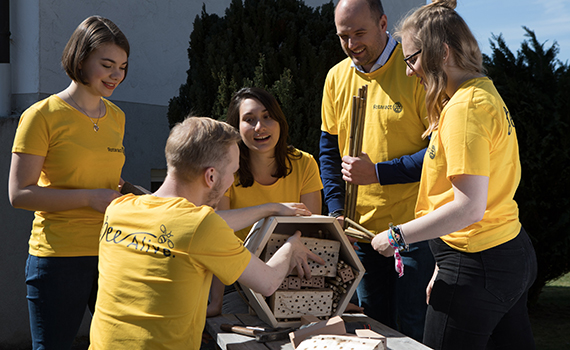
German Rotaractors build hotels for wild bees as part of the BeeAlive project.
By Henrik Thiele, a member of the Rotaract Club of Paderborn, Germany, and president of the Rotaract Germany Committee
Recently, Rotaract clubs throughout Germany were looking for a signature project and decided to concentrate on the environment. After watching a Swiss documentary on bees, “More than honey,” one Rotaractor became passionate about focusing our attention on protecting these little superheroes. Did you know, for instance, that wild bees are responsible for pollinating more than 80 percent of our crops and wild plants? We can’t survive without them.
Most of the dangers to bees are man-made. Climate change, monotonous agricultural landscapes, and pesticides are just a few of the many reasons why our little yellow friends are dying in ever-increasing numbers.
With the project “BeeAlive” German Rotaractors began to support wild bees by building bee hotels, educating people about the threat to the bee population, and sowing wildflower meadows. All German Rotaract clubs participated, starting with the most northern club of Flensburg, which visited a beekeeper with their sponsor Rotary club. The southern-most Rotaract club in Germany, Kempten Allgäu, planted a meadow of more than 32,000 square feet for bees to pollinate.
The Bundessozialaktion (BuSo) project, as it is called in German, is divided into three parts:
Inform
All the Rotaract clubs in Germany worked together to education the population about bee mortality and the associated consequences for our environment, organizing theme days and informational events. We found many opportunities to cooperate with beekeepers’ associations and nature conservation associations. Efforts ranged from the Rotoract Club of Berlin organizing an online presentation that was promoted across the country, by Dr. Kaspar Bienefeld, a renowned scientist and professor in the field of insects and bees at the Humboldt University of Berlin, to the Rotaract Club of Rheda Wiedenbrück holding a local fair.
Fundraising
Many of the projects are costly. Therefore, fundraising is an integral part of our efforts. The Rotaract Club of Duisburg-Niederrhein organized a Bee-Pong tournament, raising over $1,000 and the Rotaract Club of Paderborn hosted a Pub Quiz on the topic of bees. Clubs also got creative by selling homemade products, from beeswax chapsticks by the Bad Wörishofen-Mindelheim Club to bee-hotels (Herne-Wanne Eickel). There are also many organizations that do great work with our fundraising, like the NaBu; the German Nature and Biodiversity Conservation Union, or the local beekeepers associations.
Hands-on
By building bee hotels and diversifying local beds, we make room for wildflowers and create a better environment for insects. Over 100,000 square feet of meadows were planted by clubs in District 1841 and by the Rotaract clubs of Lemgo-Lippe and AC Landshut-Trausnitz. In many of these, Rotaractors, Rotarians, family and friends joined together.
Building a few thousand hotels, we were already able to surpass our goal of 500. The reason is simple. All you need for a hotel is a wooden frame for the outside, hardwood with holes drilled into it, and hollowed out bamboo for the inside. The best part is that you can put up a plaque reading “Made by Rotary/Rotaract” and you have the perfect ambassador for Rotary in your local community.
All in all, we hope to make the world a better place by raising awareness of this important issue and working to solve the problem in our local communities. But this is not an issue that can be solved locally. It is a global problem and we need to make a global impact. Join us in our efforts.
Post your actions under the hashtag #beealive and contact us at: soziales@rotaract.de

Reblogged this on Rotaract Club of SLIIT.
LikeLike
Pingback: What’s all the buzz about bees? – Rotary e-Club of Arizona
John … Persevere … It’ll take you a year and more to gat a handle on Rotary’s organisation and algorithms. Worth the effort.
LikeLiked by 1 person
So many of these stories would make nice entries on the international section of our Rotary Club website – but I’m guessing to use them in that way – and especially to use the graphics – would be an infringement of copyright? This is a shame as the story simply goes untold.
LikeLike
Actually John, we encourage clubs to reuse most of the content here on our blog, as well as on Rotary.org. We secure a non-exclusive perpetual license to use, publish, print, reproduce, duplicate etc. all photos or graphic materials through a license agreement. And clubs are encouraged to use stories shared here as long as they are within Rotary purposes.
LikeLiked by 1 person
That’s good news. I’m relatively new to Rotary and – although doubtless it’s my own skill deficit – where to find that sort of information amongst the multiple Rotary sites is something I’d obviously failed to stumble upon. Thanks.
LikeLike
Pingback: What’s that buzz?